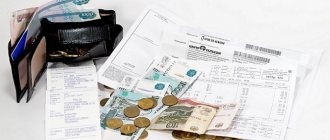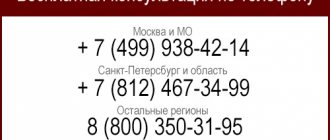General provisions
Payment for some services is carried out on the basis of readings from house and apartment meters. If there are several metering devices, the homeowner does this:
- Captures and records device data. At the same time, the number of registered citizens may affect the size of the quota, which reduces the payment amount, if any.
- Tries not to exceed the standard so that the accrued payment is optimal.
The question of whether rent affects the number of registered people is quite subjective, since it can only be decided by the owner.
Payment for housing and communal services is related to how many people are registered and live in the living space. The more residents you register, the higher the amount. Please also take into account that penalties are charged for late payment, and their amount also increases.
What to do if the owner of a share in an apartment does not pay rent
Bearing expenses for an apartment is the common responsibility of all shareholders. If one of them does not pay a personal bill, debts begin to accumulate.
In this case you probably need:
- A peaceful solution to the issue - the owners decide how to influence the defaulter. It’s one thing if a person simply forgot to pay a bill, and quite another when he doesn’t pay systematically.
- Applying to the management company for division of a personal account is the best option in the case of shared ownership (Article 249 of the Civil Code of the Russian Federation). The main thing is that the shares are presented in the form of rooms (see “Agreement on determining shares in an apartment”).
- Court intervention – in case of refusal to pay or divide personal bills for housing and communal services.
Let's start with a peaceful solution to the issue, when it is still possible to influence the debtor and the debt is not so large.
How does the calculation work?
The standards established by law may vary depending on the specific region. According to these data, it is calculated how much utility resources each user spends monthly. If metering devices are not installed in the house, then the rent is affected by the number of registered people, even if no one lives in the apartment . The same calculation procedure is established for temporarily registered persons.
When the home is not equipped with any appliances, the rent will be affected by the number of registered people and the tariff amounts are calculated:
- drainage;
- gas supply;
- provision of cold and warm water;
- electricity supply
This is interesting: Registration in apartments
Calculation of payments for housing and communal services is carried out on the basis of standards approved at the place of residence in a certain region. However, waste collection fees are also increasing. To make the calculation, the number of persons registered in the living space must be multiplied by the consumption standard.
Recalculation of utility bills
A long absence from an apartment is a good reason for not paying the bills: for electricity, water, gas and other consumed resources. According to the Decree of the Government of the Russian Federation No. 354 (as amended on February 23, 2019), the owner of the share is assigned the right to review utility bills.
In what cases can you apply for recalculation:
- Absence from residence for 5 days or longer
Many owners have a share in one apartment, but are registered in another place. If a person does not have debts for housing and communal services at his main place of residence, he has the right to apply for a recount. This will allow you to save money and not pay “for air”, i.e. for those services that a person does not use: water, gas, electricity.
Other good reasons to apply for recalculation are going abroad, for treatment, to another city, or on a business trip. Of course, if there is evidence: air and railway tickets, bills, invoices, medical insurance, international passport, etc.
- Poor quality of service
Owners can get rid of charges for improper home maintenance. However, they will have to prove the fact of poor quality services - invite housing office specialists and measure current indicators: heating, hot water, electricity. If it turns out that the standards are not met, the management company or homeowners association will issue a recalculation.
- Lack of housing and communal services
This means turning off water, electricity and heating due to repair work. Usually MosOblEIRTS carries out the revision of accounts automatically. But it happens that the service was disconnected - but the bill is the same. This is a reason to contact the Criminal Code with an application for recalculation of payments.
The return response is given within 5 days. If you are denied a recalculation, but you think you are right, go to court.
What utility bills are affected by the number of registered persons?
The fee is based on the volume of each service consumed by residents. The following indicators should be taken into account:
- housing area;
- current tariffs;
- number of registered citizens;
- availability and serviceability of metering devices.
But does the rent always depend on the number of registered people? For example, the payment for electricity is not affected by how many people are registered, since the amount is calculated in accordance with the volume of service that the consumer received. The amount does not depend on who is obliged to pay for the “utilities” - the owner of the property or its tenant. Heating payments are calculated according to the size of the living space. The larger the footage, the higher the payment.
The amount of charges for cleaning the local area, for the maintenance of elevators, garbage chutes, staircases, attics, basements and utility rooms is divided between apartment owners according to the occupied footage.
Registration has nothing to do with the size of this amount; only the total area of the premises is taken into account. The owner of privatized housing does not pay more than the standard, but regularly.
Is it possible to evict the owner from an apartment for non-payment?
Late payment or lack thereof is a serious basis for the application of sanctions by the Management Company. However, no one has the right to arbitrarily evict the owner from his apartment (Clause 4, Article 3 of the Housing Code of the Russian Federation). Only the court has this right.
The remaining residents will not suffer - the co-owners are not liable for each other's debts . Moreover, the owners have a pre-emptive right to purchase the share of the defaulter (Article 250 of the Civil Code of the Russian Federation). If none of them agrees to the redemption, the share will go to public auction. All this suggests that failure to pay for housing and communal services may result in the loss of part of the housing.
Watch a video about calculating utility bills for common shared ownership
- Due to frequent changes in legislation, information sometimes becomes outdated faster than we can update it on the website.
- All cases are very individual and depend on many factors. Basic information does not guarantee a solution to your specific problems.
That's why FREE expert consultants work for you around the clock!
- via the form (below), or via online chat
- Call the hotline:
- Moscow and the Region
- St. Petersburg and region
utility bills be paid in this case ?
Payment of utility bills for shared ownership
According to the Civil Code of the Russian Federation (Article 210), the owner of the property is responsible for the maintenance of the property, including timely payment of utilities, and Article 249 states that the burden of maintaining an apartment in shared ownership is borne by each participant (owner) in proportion to his share in the apartment.
Once the owner has acquired housing, he is required to pay some utilities. The law includes the maintenance and repair of housing (including payment for an elevator), as well as payment for heating, among these services, without providing recalculation for the temporary absence of owners (clause 54 of the Rules for the provision of utility services).
In addition to the listed services, homeowners are required to pay for utilities and consumption according to metering devices: cold and hot water supply (per person), electricity and gas supply (per person). The cost of these services is subject to recalculation in the temporary absence of the owner in the apartment, if they are charged according to consumption standards (clause 54 of the Rules for the provision of utility services). According to Article 155 of the Housing Code of the Russian Federation, non-use by the owners of the premises is not grounds for non-payment for services.
If you don't live in an apartment...
Some utility bills, which are calculated based on consumption standards, can be recalculated if the owner of the premises has not lived in it for some period of time. Such an owner has the right to ask for a recalculation in accordance with his share in the apartment.
Recalculation is carried out on the basis of a written application from the owner. He must provide a document confirming temporary registration at the place of actual residence. The application should be accompanied by copies of receipts for payment of utility services, which are paid by the consumer at the place of actual residence.
Recalculation can be made for utilities: cold and hot water supply, sewerage, electricity and gas supply. Carried out in the absence of individual metering devices for the listed services in the apartment.
In case of failure to provide the above documents, it is considered that the owner lives where he is registered, and the consequence of this can be considered receipts with bills for payment of utility services in the amount corresponding to the number of owners of the apartment.
If the “ex” didn’t agree...
Payment of utility bills for some services (maintenance and repair of housing, heating) is mandatory based on the laws listed above. But payment for services, the cost of which is calculated depending on the volume of consumption, depends on the case. Thus, the owner of a 1/2 share of an apartment is not at all obliged to pay for some utilities (water supply, gas, electricity), if he does not live in this apartment and pays for utilities on time at the place of actual residence. However, a controversial situation may arise in which the second owner of a share of the apartment is involved, and he does not pay utility bills.
According to the law (Civil Code of the Russian Federation, Article 210), for an apartment that is in shared ownership of spouses (including former spouses), all persons in whose share the apartment is located are required to bear financial responsibility. If the second owner does not pay the rent, then the remaining owners of the apartment have the right to force the defaulter through the court to pay off the utility debt and pay the bills.
However, it is possible that the management company itself will try to collect all existing debts on the apartment in court. In this case, material claims will apply to all apartment owners if there is only one personal account. If utility bills are divided and one of the owners proves that he has paid his part of the debts, claims are collected from a certain defaulting owner on the basis of his separate account. In this case, only the amount for the last three years before the limitation period expires can be recovered.
What are “separate utility bills”?
According to Article 247 of the Civil Code of the Russian Federation, ownership and use of an apartment in shared ownership occurs by agreement of all its owners. At the same time, each of the participants has the right to pay rent on the basis of a separate invoice (separate receipt) within one personal account.
In other words, the invoice receipt can consist of two invoices for each owner, according to the shares of each. To split utility bills, you should contact the management organization or HOA with a written application from each owner with attached documents for the apartment. The owner’s refusal to share utility bills and, therefore, the refusal of responsibility for the maintenance of the apartment and payment for services, is resolved in court.
>>>
How to determine the share of each registered person
In order to optimize costs, each resident’s share is allocated, since calculating the volume of service consumed can be difficult. At the same time, it is important for the owner to determine how much he must pay for housing and communal services for each tenant. It should be noted that the share is calculated approximately, because it is difficult to determine how much service a particular tenant used.
This is interesting: Is it possible to go to a clinic other than your place of registration? How to detach from one clinic and attach to another
Calculation scheme
Take the total amount calculated for each appliance or the entire rent amount and divide by the total number of residents. This quotient is equal to the share of one tenant.
The share will still be approximate, since it is difficult to calculate how a “utility” is defined. It is possible to determine the share with accuracy if there are no metering devices and payments are calculated according to standards.
What are “separate utility bills”?
So, the optimal solution in our situation may be separate utility bills. Property is in shared ownership when it belongs to several persons and their shares in ownership are established by agreement or court decision (Article 244 of the Civil Code of the Russian Federation). Participants in shared ownership pay in proportion to their shares for the maintenance of common property and make other payments (taxes, etc.) (Article 249 of the Civil Code of the Russian Federation). In the event of improper fulfillment of the obligation to make payments for residential premises that are in shared ownership, as well as utilities (Article 153 of the Housing Code of the Russian Federation) and the formation of debt through the fault of one of the owners, others have the right to demand that he conclude an agreement on the procedure for paying for utilities in proportion to the share everyone. If an agreement is reached, it is necessary to send to the service provider (management organization) with whom the contract is concluded a joint statement containing a request to make charges in accordance with the terms of the agreement reached and to issue separate payment documents. After this, each of the participants has the right to pay rent on the basis of a separate invoice (separate receipt) within one personal account.
In other words, the invoice receipt can consist of two invoices for each owner, according to the shares of each. To separate utility bills, you should contact the management organization or HOA with a written application from each owner with attached documents for the apartment. If a response to a proposal to conclude an agreement is not received or a refusal is given, this means that the parties have not reached an agreement. The owner’s right to incur expenses commensurate with his share for paying for utilities and living quarters and, accordingly, to receive a separate payment document is based on Art. 209, 249, 309, 310, 434 Civil Code of the Russian Federation, Art. Art. 30, 39, 153, 158 of the RF LC, and is also confirmed by judicial practice (see question 27 of the Review of Legislation and Judicial Practice of the RF Armed Forces for the fourth quarter of 2006, approved by the Resolution of the Presidium of the RF Armed Forces dated 03/07/2007). The claim is filed in accordance with the requirements of Art. 131–132 Code of Civil Procedure of the Russian Federation. It is submitted to the district court according to the general rules of jurisdiction (Article 28 of the Code of Civil Procedure of the Russian Federation). State The duty is paid based on the requirements of Art. 333.19 of the Tax Code of the Russian Federation (when filing a claim of a property nature that is not subject to assessment, as well as a claim of a non-property nature: for individuals - 300 rubles). The claim to the court must contain the following requirements: establish a procedure for payment by the owners for residential premises and utilities, according to which payment for the maintenance and repair of the common property of the house, as well as for utilities, is paid by the plaintiff and defendants (other owners) in proportion to their shares ; impose on the management organization of an apartment building the obligation to conclude a separate agreement with them defining the procedure and amount of payment and issue separate payment documents in relation to the owners.
After utility bills are divided, it will be easier for the owner to prove in court that utility bills were paid in full and on time on his part. And the ex-spouse who does not pay his share of utility bills bears full personal responsibility.
Did you previously think that you would have to pay the outstanding debt on utility bills of the co-owner of the apartment? Let's find out if this is really so.
Which tenants are required to make payments?
An important point that requires clarification: how does registration or lack thereof affect the rent ?
No one is registered
If no one is officially registered in the living space or if a person is not registered, but lives, then the rent is calculated as if one person lives. This calculation procedure is applied monthly until the number of registered persons increases or until the owner obtains a certificate stating that the person does not live at the place of registration.
Nobody lives
Temporary registration allows you to live when you do not have your own place of residence. The type of registration does not affect the payment for the supply of the following services: electricity, gas, water supply and sewerage.
But there are cases when temporary registration is issued without actual residence. If it is necessary to register, for example, near work, an act of non-residence at the place of registration is also drawn up (sample below).
As a rule, even before changing the address of a potential tenant, it is necessary to agree on who will pay for housing and communal services. Through agreement, the rent can be reduced or reduced. You can agree on payment for those services related to registration - garbage removal and heating. It is not difficult to calculate these amounts, because they are detailed in incoming payments.
Arbitrage practice
Controversial situations arise all the time. Often the court hears the claims of heirs, ex-spouses and even close relatives.
The main disputes may be as follows:
- determining the procedure for paying utility bills;
- establishing the size of shares between apartment owners;
- recalculation of payments – if the owner does not live at the specified address;
- financial calculations if there are beneficiaries and children;
- the amount of fines and penalties;
- calculation of payments for non-residential premises.
Example:
The couple divorced and they were left with a 2-room apartment. Initially, the housing belonged to the wife, husband and 20-year-old daughter - in equal proportions. The husband moved out of the apartment, and the mother and daughter remained to live in it. The wife offered her husband to sell the share, but he did not agree. At the same time, the amount of utility bills has increased. The wife paid for them alone, while the ex-husband did not even show up at their place of residence. After 2 years, the wife decided to divide personal accounts in proportion to the shares in the apartment (her own and her daughters together, her ex-husband – separately). The husband did not make contact, notifications did not reach him. Management company employees refused to split the accounts because the consent of the third owner was not obtained. The ex-wife filed a lawsuit for the forced division of personal accounts + a demand for the collection of payments made by her from her ex-husband. Along with the claim, copies of personal accounts, receipts, checks and extracts from the EIRC were submitted. The grounds were confirmed, the fact of non-payment was established. The magistrate's court ordered the Criminal Code to divide the personal accounts between the co-owners (⅔ remained with the wife and daughter, ⅓ with the husband). Thus, the defendant was ordered to pay compensation for 2 years and make utility bills within his share.
Enforcement measures against a defaulter for refusal to pay bills
The owner is directly responsible for late payment for housing and communal services , since suppliers deal with the management company or directly with the owners. The person who owns the housing is responsible for non-payment of utility bills (Article 153 of the Housing Code of the Russian Federation). Therefore, every owner must ensure that payment is received on time.
This is interesting: Registration without the right to living space: temporary, permanent
In a situation of delay, the issue of how to force the registered person to pay utility bills should be resolved.
List of measures to force you to pay your share:
- separation of personal accounts;
- warning about deprivation of registration;
- filing a claim with a judicial authority.
What to do if the registered person does not pay the rent ? In case of delay, the owner of the property has the right to unilaterally terminate the contract. By going to court, you can recover your utility debt. You will first need to pay it off yourself by signing. This serves as proof that the owner himself paid for the utilities. The formation of a payment slip includes the name of the owner, but in the case of division of accounts, several persons will be listed.
Utility debts are collected in the following ways:
- refusal to provide services;
- lawsuit;
- eviction of unwanted tenants.
Formation of a personal account
A financial-personal account (FLA) is a bank account to which utility payments from the owners of a particular apartment are received.
It is formed taking into account:
- living space area;
- the number of residents registered in it.
Most often, an agreement to pay for housing and communal services is concluded with one of the shareholders, whose name is subsequently indicated on the payment receipt.
But, since other owners living in the apartment have the same rights to use the apartment and services, they must also bear equal responsibilities for payment.
Unfortunately, in practice it is not always possible to peacefully and harmoniously agree on equal pay. The reasons may be very different, but they all lead to one thing: the need to divide the bills, or, to put it legally correctly, to allocate a share in the payment of housing and communal services for each shareholder. That is, to generate several payment documents for one apartment.
Unfortunately, there are no direct rules or described procedures in legislation on this issue. But, nevertheless, in many cases such situations are successfully resolved. We will tell you below which authorities you need to contact for this.
Conditions required for account splitting
The very first condition is that the apartment must be in common shared ownership, and not in joint ownership. In the latter case, splitting accounts is not possible.
First, you will have to contact Rosreestr to re-register the form of ownership of the housing, allocate a share for each and receive separate certificates indicating the size of the housing space owned by the shareholder.
The following points must also be observed:
- A separate account can be issued only for the owner of the share. Citizens registered in the apartment simply cannot have their own account.
- Splitting accounts is only possible in privatized housing. The new Housing Code of the Russian Federation prohibited carrying out such a procedure in municipal apartments.
- Each owner must have a separate room. Therefore, it is impossible to split bills in a one-room apartment.
In this respect, all owners are in an equal position.
If a person is not the owner, but is simply registered in the apartment, it is impossible to legally oblige him to pay bills. Here you will have to influence only your own methods.
So how to separate personal accounts technically?
There are two options for this:
- if the residents have reached an agreement in principle on the issue of dividing the payment, then they should contact the management company;
- If there are disagreements, the issue will have to be resolved through the courts.
Each method has its own characteristics and rules.
Appeal to the Criminal Code
If all the owners have made a firm decision to divide the FLS and agree on this issue, then you can go to the management company, having first collected the following package of documents:
- certificates of ownership of all shareholders (or extracts from Rosreestr, if the apartment was recently purchased);
- passports with a stamp of registration in this area (including those who do not actually live on it);
- technical passport of the apartment;
- statements from each owner;
- written consent to the division from all parties having a share.
And, accordingly, there will be several personal accounts, after which each shareholder will begin to receive a separate receipt for payment.
This will have absolutely no impact on the property rights of apartment owners, but will only determine a new procedure for paying for services and the responsibility of each owner.
It will be more difficult for those residents whose home is not served by an intermediary in the form of a management company, and whose services are provided directly by resource-supplying organizations.
They, with the same package of documents, will have to apply directly to Gorgaz, Gorvodokanal, Gorernergo, etc.
It should be noted that many management companies are reluctant to go through with the procedure of separating personal accounts, since in this case they have to do additional work.
And some simply refuse. In practice, everything depends on the policy pursued by a particular company.
Having a written refusal from the management of the management company in hand, the owners will have to go to court to solve their problem. Cases of illegal refusal to divide the FLS have already occurred several times in judicial practice.
Appeal to judicial authorities
If it happens that one of the owners refuses to voluntarily divide the FLS, the problem will have to be resolved in court. Of course, this will require much more time and financial resources, but legal costs can be recovered from the defendant in this case.
FAQ
What to do if there is a debt on utility bills due to the fault of the second owner of the apartment? What rules should former family members adhere to? Let's consider what to do in such situations.
How to attract a second owner?
Even if the co-owner of the apartment does not live in the premises, he is obliged to pay for the provided utilities.
Apply to the participant himself to repay the debt, and if he refuses, file a claim in court:
- in relation to certain types of utilities (mentioned earlier), if they were not consumed, then the obligation to pay them does not arise;
- the remaining payments must be made according to the size of their share of the premises in apartment buildings.
The limitation period is no more than three years.
How are utility bills calculated?
Based on standards, tariffs and the amount of services consumed.
Is it possible to buy an apartment with utility debts in 2020? Read here.
Do you need judicial practice in collecting debts on utility bills? It is presented in this article.
Former family member
Let's look at the situation using an example:
- Citizen Ivanov lives in the owner’s premises as a former family member.
- The owner is demanding not only to pay for half of the housing and communal services, but also to carry out major repairs of the property, which is in the common possession of the residents of the apartment building.
- Ivanov argues that such a requirement does not comply with the rules described in Article 39 and Article 158 of the Housing Code of the Russian Federation, which stipulate that the owner participates in the costs of maintaining common property objects in accordance with the share in the rights of common property. The citizen refuses to pay because he is not a shared owner.
Such actions will be considered illegal. A person must rely on the procedure specified in Articles 31 and 32 of the Housing Code of the Russian Federation, where there is information that residents must participate in the costs of such a plan.
Ivanov should come to an agreement with the owner, because he could simply be evicted as a tenant, having lost his rights to residential real estate.
If the shared owner of an apartment does not pay utility bills, this does not mean that his responsibility passes to you.
In accordance with legislative acts, you have the right not to repay someone else's debt, and if such a demand is presented to you, you can sue for extortion.









